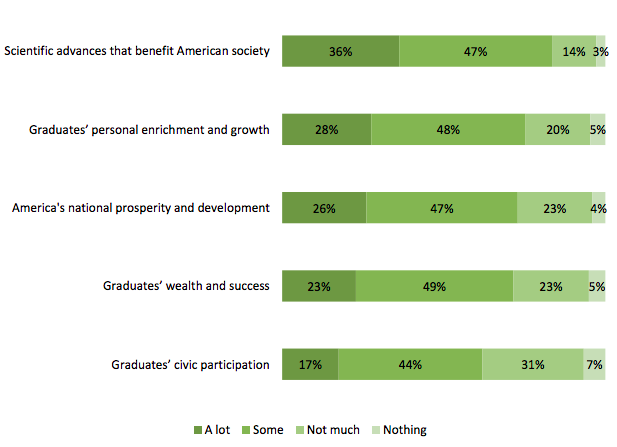Most political discussion of higher education these days focuses on the return on investment to individuals, rather than on the contributions that colleges and universities make to society broadly. So it wouldn’t be surprising to find that many Americans don’t put much stock in the “public good” arguments on which much government funding of higher education was premised.
But a new survey finds that most Americans continue to support government funding of higher education and to recognize that colleges and universities play many roles beyond helping them (or their children) get a good job or other personal return on investment.
The study by researchers at Columbia University‘s Teachers College, “Americans’ Views of Higher Education as a Public and Private Good,” is the latest entry in a string of public opinion polls over the last year that have elevated the blood pressure of many college leaders by raising doubts about the perceived value of higher education, mostly related to the price and benefits of their own education.
Noah D. Drezner, an associate professor of higher education at Teachers College and the study’s lead author, said he sought to design a survey that examined “Americans’ understanding of the various ways that colleges and universities contribute to society, beyond the return to individuals.”
As part of a larger project examining the views of roughly 3,000 adults on education, health and psychology, Drezner and his colleagues asked respondents whether public spending on higher education was an “excellent,” “good,” “fair” or “not a good” investment.
Three-quarters of respondents said public funding of higher education was either an excellent (44 percent) or good (32 percent) investment (17 percent said fair, 7 percent not good). Responses of excellent were likelier from women than men (48 to 39 percent), respondents who were black and Latinx (52 and 49 percent) than white and Asian-American (41 percent), under 45 (48 percent) than older (39-40 percent), and urban (52 percent) than rural (44 percent) respondents. It almost goes without saying that more liberal respondents (56 percent) said excellent than conservatives (32 percent).
Going further, the scholars asked respondents whether they would “like to see more or less government spending” in a range of education realms, including two-year colleges and four-year colleges. To try to take the question beyond the theoretical — so that respondents had to think about the possible additional funds as something more than “Monopoly money,” Drezner said — the researchers included this “realistic reminder”: “Remember that if you say ‘much more,’ it might require a tax increase to pay for it.”
About half of respondents said they support increased government spending — 52 percent on community colleges, and 50 percent on four-year colleges and universities. Those who answered the earlier question by saying that higher education was an “excellent investment” were much likelier (71 percent) to support more government spending. Respondents who said higher ed was a good investment were roughly divided between spending more or spending the same (45 vs. 47 percent), while a plurality (43 percent) of those who said public spending on higher ed was not a good investment favored spending less.
The Public Good
Given how much of the recent public discourse centers on the individual return from higher education, Drezner said he was heartened to find that respondents overwhelmingly “understand that there are larger benefits to the public” from higher education. The researchers asked how much American colleges and universities contribute in the way of scientific advances, national prosperity and graduates’ civic participation.
As seen in the chart below, more than seven in 10 respondents recognized “a lot” or “some” contribution in four of five areas queried, with by far the most positive response about “scientific advances that benefit American society.”
But the answers also show colleges have a lot of work to do in making the case to Americans that the institutions contribute in other areas, particularly in enhancing graduates’ civic participation, Drezner said.
“Building civic engagement is in a lot of colleges’ mission statements,” he said. “These answers suggest a disconnect in us actually achieving that mission.”



0 Comments